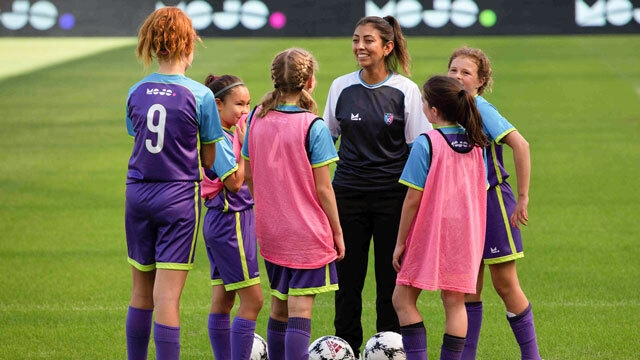Icebreakers Don’t Have to Be Cringey
A few simple get-to-know-you ideas can help build that team bond
Iva-Marie Palmer
| 4 min read

MOJO
It’s your first practice. You’re ready with some warmups, some activities and a pep talk about how great the season is going to be.
But maybe you notice that several kids seem to know each other and have formed a little group, and the rest of your team is scattered and fidgeting, looking to you for a cue.
You need an icebreaker.
“Most kids are nervous on the first day and are a bit intimidated,” says Champ Baginski, owner of Breakthrough Sports, a Los Angeles-based youth sports organization that offers classes in baseball, basketball, soccer, swimming and beyond, for kids ages 3 to 14. “Good coaches find a way to break the ice from minute number one of the first practice to ensure all kids are having fun and want to continue learning and playing that sport.”
Two simple questions
Will Robertson, a youth coach in Los Angeles who’s led baseball and track teams for three kids over 10 years, has an easy, tried-and-true approach.
When his teams first meet, Robertson makes the kids walk around and go up to each player they do not know and ask them two questions: What is your favorite team? and What is your favorite thing to eat when you go to a game? “Then I randomly ask each of them to tell everyone those two items about a player when they’re called on,” he explains. “They get to know each other based on two things that kids have in common: sports and snacks.”
Open-ended questions work because they don’t leave it up to the kids to figure out what to share about themselves. (Left to their own devices, most kids – especially preteens and teens – will only share something safe, boring and probably not memorable to the rest of the team.)
Weave it in, so they don’t notice
Some icebreakers can be worked right into your practice plan: Have two players pass a soccer ball or basketball or play catch together as they chat. Another standard format is to break the team into two concentric circles, with a player facing out and one facing in, then asking your chosen open-ended questions of the person across from them. Then the inner circle moves, and new conversations begin.
The most important piece is to have an opportunity for the players to share their new-found insight and connection with the rest of the team. It’s a great way to ensure that the effects of the icebreaker don’t fade before the next practice.
Just don’t make it painful
Don’t let the word “icebreaker” send a literal chill up kids’ spines. You want to avoid anything that might make kids feel like they have to be too creative. Also avoid making them offer up something too personal or anything that seems rife with social risk.
“I would highly advise against singling out a kid and putting them on the spot,” Baginski says.
Vanessa Van Edwards, author of Captivate: The Science of Succeeding with People and founder of Science of People, agrees. “Icebreakers are meant to help, not harm,” she says. “Some people get way too competitive or put others on the spot even if they don’t want to participate. My rule of thumb is to always remember that icebreakers are a tool. They’re not an opportunity for participants to outshine others or tell their coolest facts about themselves.”
Why icebreakers work
Icebreakers aren’t just about introducing ourselves — they’re about making connections. Plus, says Van Edwards, “Icebreakers give us little dopamine boosts, which our brains crave.”
That’s why icebreakers are used by so many organizations, not just youth sports teams. They tear down rigid ways of thinking, says Van Edwards. “They also foster a fun environment, which gets our creative juices flowing,” she says. “For young kiddos, this means greater willingness to participate in the main activity and foster relationships.” And that, as a coach, is exactly what you want.





